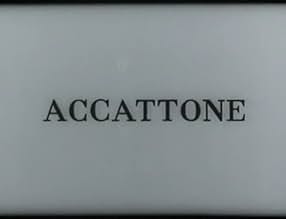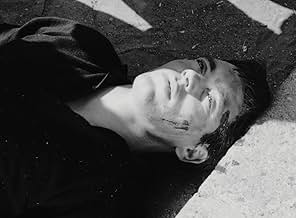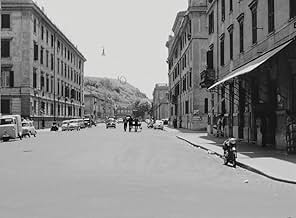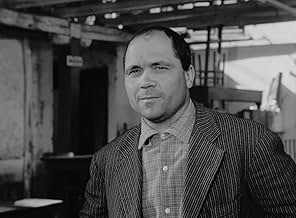IMDb-BEWERTUNG
7,6/10
10.443
IHRE BEWERTUNG
Ein Zuhälter, der seinen Lebensunterhalt auf keine andere Art verdienen kann, muss plötzlich zusehen, wie sein Leben zunehmend außer Kontrolle gerät, als seine Prostituierte ins Gefängnis ge... Alles lesenEin Zuhälter, der seinen Lebensunterhalt auf keine andere Art verdienen kann, muss plötzlich zusehen, wie sein Leben zunehmend außer Kontrolle gerät, als seine Prostituierte ins Gefängnis geworfen wird.Ein Zuhälter, der seinen Lebensunterhalt auf keine andere Art verdienen kann, muss plötzlich zusehen, wie sein Leben zunehmend außer Kontrolle gerät, als seine Prostituierte ins Gefängnis geworfen wird.
- Nominiert für 1 BAFTA Award
- 3 Gewinne & 4 Nominierungen insgesamt
Handlung
WUSSTEST DU SCHON:
- WissenswertesThis was Bernardo Bertolucci's first work in movies. He was an assistant director.
- Zitate
Vittorio "Accattone" Cataldi: Call me Accattone. There are lots of Vittorios but I'm the only Accattone.
- Alternative VersionenThe VHS and DVD versions produced by Water Bearer Films are listed as running 116 minutes, suggesting that this print is four minutes shorter than the original release.
- VerbindungenEdited into Red Italy (1979)
- SoundtracksSt Matthew Passion
Composed by Johann Sebastian Bach
Ausgewählte Rezension
Accattone is a Neo-Realist examination of slovenly irresponsibility, tastelessness and self-pity - you know, the fun stuff. Its principal characters, a group of young upwardly-immobile Roman males, are almost uniformly repulsive, a lot of chest-baring half-savages whose idea of fun is luring a whore to a deserted spot and beating her to within an inch of her life. Its hero, Accattone, is played by one of the more unpleasant actors in the history of film, a fellow named Franco Citti, who manages to single-handedly set the entire nation of Italy back about two-hundred years. It is a film of almost relentless despair, depicting a Rome so desolate and squalid, so bereft of hope, that it seems almost medieval. In the hands of almost any director the movie would be unbearable - either unbearably sentimental or unbearably grim - but with Pasolini at the helm it is merely honest.
It isn't Pasolini's best film by a long way, but it may be the clearest example of what made the director so special - his ability to probe around the most revolting recesses of the human condition without seeming sensationalistic, exploitive or crass. It would be easy to go one of two directions with a character like Accattone, a lazy two-bit pimp with a son by a woman who wants nothing to do with him: the sentimental route or the grotesque. One could easily imagine De Sica, the soft-heart of Neo-Realism, turning Accattone into a sympathetic, misunderstood Everyman. And one could just as easily imagine Fellini, the most uptight director maybe in history, transforming the character into a universal symbol of societal decay. Pasolini, neither a sentimentalist nor a moralist, sees Accattone not as a sympathetic character nor as a symbol. The least judgmental director maybe ever, Pasolini conceives his characters entirely in terms of their outward behavior, and not in moral terms. He neither psycho-analyzes nor seeks to "understand" his characters. He simply presents them as they are, warts and all.
It was always the purpose of Neo-Realism to present life as it was lived, not life as it was imagined by screenwriters, directors and actors, and there are few more successful ventures in this regard than Accattone. The film's main triumph is in its atmosphere. The Roman days have never seemed so sun-bleached, so arid and oppressive; its nights never so mysterious, so full of inexpressible longing (not even in Henry James). The characters seem bound to this world in a palpable way, their faces (shot by expert cinematographer Tonino Delli Colli) mirroring the desolation, the hopelessness, the strangeness of their surroundings. The movie's physicality, as always with Pasolini, is striking. But pure physical vigor, pure atmosphere isn't enough. Where Pasolini comes up short is in assembling the parts of his film into something with real emotional breadth. His first feature shows him already on his way to being a master of the image, but also shows that he had a lot to learn about being a master of cinematic rhythm. The strange blend of primitivism and modernism is already there but the command is not. It's a film that works well in the moment but feels thin as a whole. It's a triumph of Neo-Realist technique but it only half-succeeds as a film.
Half-successful Pasolini is still better than the best most directors have to give. If you can portray a character as repulsive, as boorish and ego-maniacal as Accattone - a character with few if any redeeming features - for two hours without alienating your audience...well, chalk one up for the director who can do that. Especially one who manages the trick without resorting to sentimental contrivance or the kind of false significance people like Fellini always tried to drum up by filling their movies with obvious symbols, the sorts of things art-film zombies love because it gives them a chance to show their alleged smarts. Pasolini never flatters his audience but he never sneers at them either. He attempts to neither ingratiate himself with the public nor antagonize it in the manner of certain self-important avant-gardists. The best artists look for what interests them in a piece of material, not worrying whether their ideas, their approach, their style is accessible to the public at large, or critics, or scholars, or their grandmothers or anyone else. Accattone shows Pasolini on the road that would make him one of cinema's best directors - a road traveled by precisely one person, Pasolini himself.
It isn't Pasolini's best film by a long way, but it may be the clearest example of what made the director so special - his ability to probe around the most revolting recesses of the human condition without seeming sensationalistic, exploitive or crass. It would be easy to go one of two directions with a character like Accattone, a lazy two-bit pimp with a son by a woman who wants nothing to do with him: the sentimental route or the grotesque. One could easily imagine De Sica, the soft-heart of Neo-Realism, turning Accattone into a sympathetic, misunderstood Everyman. And one could just as easily imagine Fellini, the most uptight director maybe in history, transforming the character into a universal symbol of societal decay. Pasolini, neither a sentimentalist nor a moralist, sees Accattone not as a sympathetic character nor as a symbol. The least judgmental director maybe ever, Pasolini conceives his characters entirely in terms of their outward behavior, and not in moral terms. He neither psycho-analyzes nor seeks to "understand" his characters. He simply presents them as they are, warts and all.
It was always the purpose of Neo-Realism to present life as it was lived, not life as it was imagined by screenwriters, directors and actors, and there are few more successful ventures in this regard than Accattone. The film's main triumph is in its atmosphere. The Roman days have never seemed so sun-bleached, so arid and oppressive; its nights never so mysterious, so full of inexpressible longing (not even in Henry James). The characters seem bound to this world in a palpable way, their faces (shot by expert cinematographer Tonino Delli Colli) mirroring the desolation, the hopelessness, the strangeness of their surroundings. The movie's physicality, as always with Pasolini, is striking. But pure physical vigor, pure atmosphere isn't enough. Where Pasolini comes up short is in assembling the parts of his film into something with real emotional breadth. His first feature shows him already on his way to being a master of the image, but also shows that he had a lot to learn about being a master of cinematic rhythm. The strange blend of primitivism and modernism is already there but the command is not. It's a film that works well in the moment but feels thin as a whole. It's a triumph of Neo-Realist technique but it only half-succeeds as a film.
Half-successful Pasolini is still better than the best most directors have to give. If you can portray a character as repulsive, as boorish and ego-maniacal as Accattone - a character with few if any redeeming features - for two hours without alienating your audience...well, chalk one up for the director who can do that. Especially one who manages the trick without resorting to sentimental contrivance or the kind of false significance people like Fellini always tried to drum up by filling their movies with obvious symbols, the sorts of things art-film zombies love because it gives them a chance to show their alleged smarts. Pasolini never flatters his audience but he never sneers at them either. He attempts to neither ingratiate himself with the public nor antagonize it in the manner of certain self-important avant-gardists. The best artists look for what interests them in a piece of material, not worrying whether their ideas, their approach, their style is accessible to the public at large, or critics, or scholars, or their grandmothers or anyone else. Accattone shows Pasolini on the road that would make him one of cinema's best directors - a road traveled by precisely one person, Pasolini himself.
- aliasanythingyouwant
- 9. Juni 2005
- Permalink
Top-Auswahl
Melde dich zum Bewerten an und greife auf die Watchlist für personalisierte Empfehlungen zu.
- How long is Accattone?Powered by Alexa
Details
Box Office
- Weltweiter Bruttoertrag
- 2.865 $
- Laufzeit1 Stunde 57 Minuten
- Farbe
- Sound-Mix
- Seitenverhältnis
- 1.37 : 1
Zu dieser Seite beitragen
Bearbeitung vorschlagen oder fehlenden Inhalt hinzufügen

Oberste Lücke
By what name was Accattone - Wer nie sein Brot mit Tränen aß (1961) officially released in India in English?
Antwort































